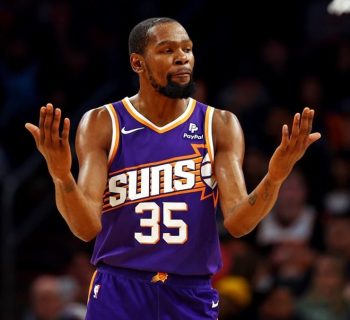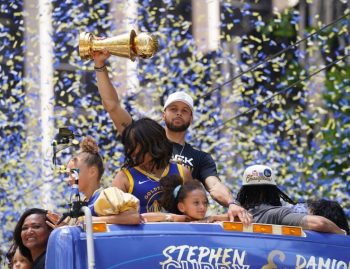NBA
NBA Saturday: Divac Right To Bank on Cousins

There was a lot of news and activity across the NBA in the days leading up to the draft. The biggest news surrounded the Sacramento Kings and the eroding relationship between the front office, head coach George Karl and DeMarcus Cousins.
Vlade Divac, the Kings’ vice president of basketball and franchise operations, was put in a tough position and had a difficult choice to make. Facing pressure from within the organization and Cousins’ camp, Divac had to decide between trading his star player, or holding firm and trying to offset the damage that had already taken place. At least for now, it appears Divac is going to hold onto Cousins and try to mend the relationship between his star player and head coach (which won’t be easy by any means).
There are a lot of reasons to like this decision from Divac, who is just in his fourth month as a front office executive. However, the most important reason is that Cousins is simply too good of a player to trade in response to a situation like this. We’ve seen teams come out on top after trading a disgruntled star player in recent seasons (for example the Orlando Magic with Dwight Howard), but the league is now collectively aware that gutting a roster for one star is far from a sure bet, and teams are now more cautious. The Kings were highly unlikely to get equal value for Cousins and Karl has little interest in developing rookies and second-year players.
But again, the main point is that Cousins is just too good to move on from at this point. Here’s a look at what makes Cousins so dynamic.
The first thing to note about Cousins is that he is still just 24 years old. This is a big deal since Cousins has already established himself as an elite center and still hasn’t even hit his prime years. And though Cousins has had some personality issues and clashed with coaches and teammates, he has made progress over the years and looked very comfortable playing for Mike Malone earlier this season. So while he may be difficult to handle, there is reason to believe that he can continue maturing and, in the right situation, keep his attitude in check.
This last season, Cousins averaged 24.1 points, 12.7 rebounds, 3.6 assists, 1.5 steals and 1.7 blocks per game, while shooting 46.7 percent from the field. The common argument we hear against Cousins is that he puts up hollow numbers on a bad team. It’s easy to understand that criticism. The truth, however, is that Cousins really is one of the most productive players in the league and had the Kings put even a slightly more effective roster around him, that would be more apparent. Consider the fact that Darren Collison and Cousins were the only two Kings players (among players that played more than 100 minutes) to have a positive on/off court differential this last season. Furthermore, only Collison, Cousins and Rudy Gay had a PER rating above the league average of 15, meaning that Cousins was constantly playing with lineups where many of his teammates were contributing at a below-average level.
To try and illustrate the point that Cousins can be a meaningful contributor on a strong team (as opposed to a hollow contributor), let’s take a look at the lineup graph below.
Chart Courtesy of NBA.com/stats
Here, we see that the Kings’ starting lineup was one of the most effective and efficient in the league, despite the fact that Ben McLemore and Jason Thompson were inconsistent contributors, at best. This lineup had a +16.4 net rating, and held opponents to just 91.8 points per 100 possessions (beating the Golden State Warriors’ starting lineup by three points). The only starting units that ranked ahead of the Kings’ starting unit in net rating were the Warriors’, Cleveland Cavaliers’ and Los Angeles Clippers’.
Critics of Cousins may want to argue that this data doesn’t prove his production is meaningful or that the sample size is too small since that lineup only played in 30 games together. But that lineup was as good as it was because of its defensive prowess and that has everything to do with Cousins. He had the best on-court defensive rating (103.3) of all Kings players (who played more than 100 minutes), and when he was off the court, Sacramento gave up 109.7 points per 100 possessions, according to NBA.com.
Cousins is a better defensive player than he is given credit for and still has a lot of room for improvement. According to Nylon Calculus’ rim protection statistics (which incorporate SportVU data), Cousins held opponents to just 47 percent shooting at the rim, which is good, but not great. That comes out to roughly 0.48 points saved per 36 minutes, which is by no means Rudy Gobert-level defense, but it’s not bad, especially for a guy that spent more than half the season recovering from viral meningitis and played for three coaches in one season. Cousins isn’t a super athletic rim protector like Gobert or Serge Ibaka, but he is effective in the right schemes.
And we all know what Cousins can do on offense. He is probably the only center in the league that can hit the mid-range jumper, dominate in the post with his back to the basket and lead a fast break off of a defensive rebound. Cousins is impossibly quick for someone of his size and weight, and is near impossible to stop when he is focused, engaged and healthy. When Mike Malone pulled Cousins away from the middle of the court and put him to work closer to the basket, we saw just how dominant he could be.
And Cousins is more than just a scorer. He is a very talented passer and has a knack for finding open teammates out of double teams. He may not be at the playmaking level of Blake Griffin at this point, but it’s not hard to imagine the Kings running their offense through Cousins the way the Memphis Grizzlies run theirs through Marc Gasol. The Grizzlies aren’t the gold standard of modern NBA offenses, but situationally the ability to run the ball through a dominant center that can zip accurate passes to teammates is a nice weapon to have.
Where Cousins stands to improve is in efficiency. His shooting percentages aren’t great and he doesn’t dominate in any single category, such as points per possession in pick and roll or isolation plays. But that could be seen as a positive as well since it’s more reason to believe that Cousins still has a lot of room to improve. We hear so often about how important it is for teams to have strong three-point shooting to space the floor so big men have room to operate in the post. Well, the Kings were 28th in the league in three-point attempts per game (16.5), and were tied for 10th worst in three-point percentage (34.1). Basically, opponents knew the Kings weren’t going to beat them from beyond-the-arc, so they could keep their wings closer to the paint and quickly double-team Cousins any time he caught the ball.
Cousins hasn’t had the benefit of playing with a strong supporting cast, like Dwight Howard had in Orlando when he was surrounded by three-point shooters and lived off full court rim-runs and nice sets off of screens in the post. Howard is in a similar situation with Houston, though due to his poor health and less emphasis on getting him easy shots, he has been less effective. But the point is, Cousins basically produces at an elite level in spite of his team, not because of it. Put Cousins in a situation similar to Howard’s and it’s scary to think about how much better he could become.
The onus is on Divac and the rest of the Kings’ front office to mend the ailing relationship between Cousins and Karl and to get some effective teammates around him. It’s too early to move Cousins in a deal for rookies and assets. We still don’t know how good Cousins can be when surrounded by a competent supporting cast and in a stable environment. Considering his age, the fact that he is on a favorable contract and how good he already is despite the less than ideal circumstances that have existed throughout his career, Kings fans should be happy that Divac has decided to stand his ground and bank on Cousins.














